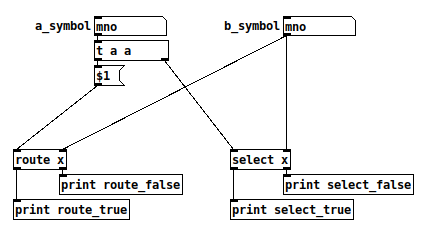Was going to ask, but I think I found the answer anyway.

You must remove the 'symbol' selector for [route], and you must not remove it for [select].
Pd has such a sense of humor sometimes.
hjh
How to match two symbols
Was going to ask, but I think I found the answer anyway.

You must remove the 'symbol' selector for [route], and you must not remove it for [select].
Pd has such a sense of humor sometimes.
hjh
@ddw_music As a computer programming language, Pd mystifies me. That's why I try to think of it as a scripting language, 
The whole selector system is flawed, but [route], when not used with special selectors, works just on the selectors, as it is described in the help file.
Pd would be so much better if just
and that would be all.
But it is what it is and we have to live with it or build a better system.
Although it is awkward sometimes, it is still possible to do everything that is needed with what we have.
Clearly, the idea behind the design was that people would use their own selectors and that selectors would be a thing, but they are not and it does not help in any way, but now it is too late and we can just cry about it. Or laugh. 
would use their own selectors and that selectors would be a thing, but they are not and it does not help in any way
 Selectors are used all the time. Every method - apart from float, symbol and pointer methods - starts with a selector. For example, if you send
Selectors are used all the time. Every method - apart from float, symbol and pointer methods - starts with a selector. For example, if you send [set foo( to [tabwrite], set is the selector.
@ddw_music I always look first to the list-abs library.
It is rare that it does not contain a solution and the names of the abstractions make for an easy search.
[compare-any] seems to work.
David.
Oops! Looks like something went wrong!